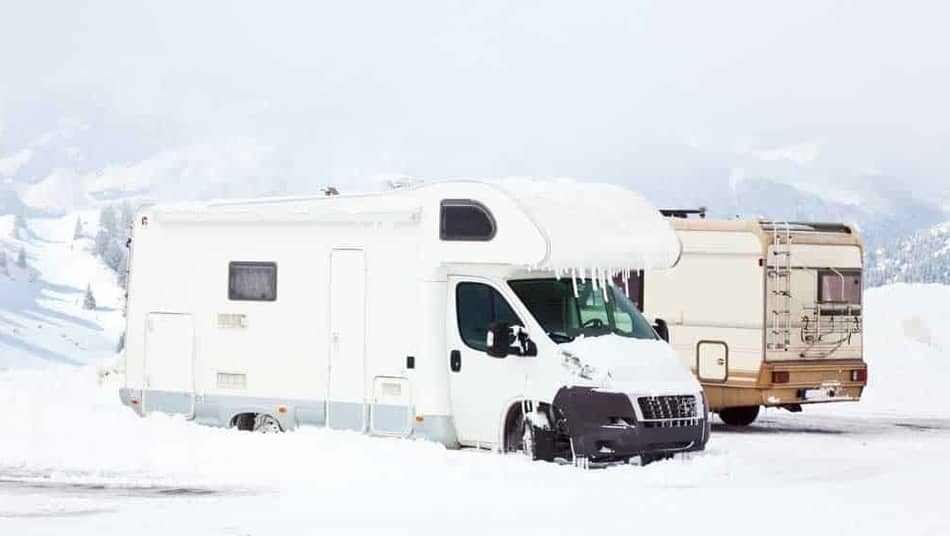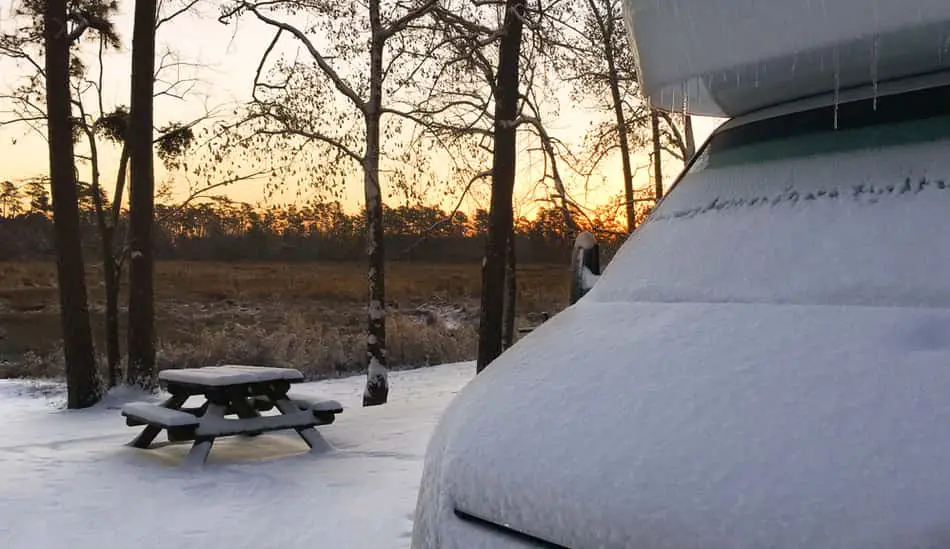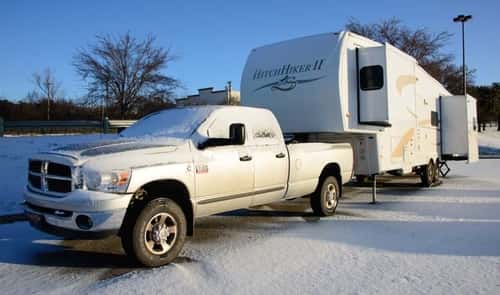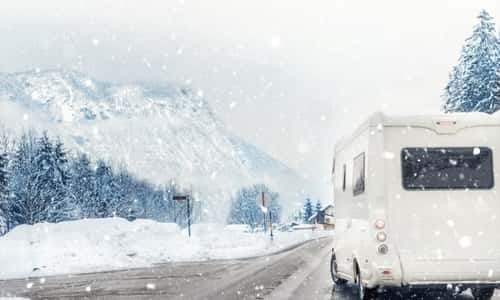How to Keep RV Warm in Winter?

Everyone knows that the summer is the best time for road trips, but that doesn’t mean that your RV is ready for the first snow. Winter RVing lets you experience a whole new variety of outdoor activities, which aren’t available during Summer, such as skiing and snowboarding or just mingling around the Winter wonderland.
The big question you probably ask yourself is; how to keep your camper warm in the winter? Even the best RVs don’t have quality insulation like normal homes do. And like a regular house, RVs also have a lot of temperature and moisture-sensitive electronic systems that can be impaired by winter temperatures and weather.
If you are interested in keeping your RV warm and cozy during the cold winter nights while you go camping, as well as preparing it for harsh winter weather overall, keep on reading.
Table of Contents
How to Keep RV Warm in Winter?
So How to Keep RV Warm in Winter? Usually, the best way to keep your RV from cold temperatures during winter is to use foam insulation boards, solar blankets, bubble insulation, etc. Also, a great way to add extra warmth is to line your RV windows by using heavy-weight thermal curtains and by using RV sealant or caulk.
For those who want to learn more, be sure to read RV Window Seals Shrinking? Why and How to Fix It.
Ways To Use Your RV During the Winter

When it comes to spending the cold winter in your RV, there is only one thing that you actually need to do: prepare! Even though it is a vehicle, your RV is your mobile home, and just like with any other home, it needs to be warm. Have you ever heard that pipes in regular homes can freeze during cold winter? The same can happen with your RV. But that’s not the only thing that can go wrong! Your RV batteries are draining way faster in the ice-cold temperatures than they would in Summer.
Although RVs come with thermal packages, which come with even more insulation, sometimes it’s just not enough for that harsh sub-zero weather. If you plan to go camping in the biting cold, dress your RV up in a skirt! RV skirting will keep the batteries a bit warmer and add more layers of insulation to the plumbing and electronics of your vehicle. And if you don’t have an RV skirt, you can make a snow cover around your RVs chambers.
The biggest heat loss in RV are windows, and manufacturers just can’t claim otherwise. But there are a few do-it-yourself ways on how you can add that extra edge of insulation, such as Polyisocyanurate Foam Panels, thermal blankets, bubble insulation foils, etc. Another way is to use heavy-weight thermal curtains which will give you extra warmth.
One of the ways is to use a layer of silicone around your RVs doors and windows, to ensure that they are air-tight. Also, check the stripping around those areas to guarantee nothing is damaged, broken, or loose, and if it is, make sure you replace it before you go camping!
The pipes, the batteries, and the plumbing are some of the main parts of your RV, but they are the RVs weakest points. Although putting on a skirt on your RV may help, you’ll also want to invest in trace heating the pipes and to make sure your RV water doesn’t freeze. If you are connected to a city water connection, you can buy heated RV water hoses.
If you do not want to spend extra money on a heated hose, you can add some extra insulation or tapes/bands to your current water hose, or you can fill your freshwater reservoir and use that as your source of water as an alternative. The important thing is to not use a water hose in freezing cold weather if you did not insulate it in any way, because if it freezes and breaks, there’s a lot of cleaning up you will have to do, which is never good, especially in freezing cold!
Best Way To Keep Your RV Warm in the Winter

There is one big uncertainty when it comes to RVing in the winter and it involves the HVAC system. A large number of RVs have a thermocompressor as well as an onboard boiler that uses propane. But which one do you use in winter?
It’s quite simple really: if the temperature goes below 45 degrees, use the RVs boiler, if it’s over 45 degrees, use the Thermo compressor. The HVAC system can only warm up to a certain point, and if you go above that point, you risk overheating the system.
The boiler is very effective in heating up a space quickly, but it uses propane gas to heat, which also means that if you are going to use your RV during the winter, you better be packed with a lot of propane! When leaving your RV, make sure you set the thermostat switch ON, so that the temperature inside the RV does not drop very low.
Another great and effective way to keep your RV home cozy during the winter is to buy indoor heaters! There are electric and propane gas heaters which you can use. The amperage or gas amount that they use is minimal and much cheaper than having to reinvest in new plumbing and pipes systems if they break after freezing.
If you want to make sure that your heaters are as efficient as possible, try keeping your cabinet doors open to ensure that the warm air inside the RV gets to the pipes. That’s the most important part when you are not currently in your RV, so the doors won’t disturb your RV accommodation.
Winter RV Living Checklist
Now that we have gone over the fundamentals of making your RV warm and cozy, let’s see how to keep YOU warm and cozy! Living in a mobile home over winter can be challenging, even under the best conditions, so here are a few must-have items that you need to have with you!
Besides all the stuff that you would pack for a regular road trip, keep in mind the items listed below:
- Thick jacket and other winter clothes
- Snow shoes and cold weather shoes
- Trace heating tape, thermal blankets and other insulants
- Freezeproof hosepipe
- RV skirt
- Ice scraper
- Spare canister of antifreeze – for your RV as well as the tow vehicle
- Indoor heater (electric or propane)
- And last but not least, cups for your hot beverages as well as your coziest blanket!
What’s the Best RV For Winter Living?

Even though there are a lot of RVs that are considered highly insulated, not all mobile homes are manufactured the same when we talk about spending time in your RV during winter. For example; spending a night in a pop-up trailer during winter is a great way to get shivers, or if you are lucky, just a sleepless night!
The top mobile home you can pick for winter is the one that’s self-reliant and completely insulated, maybe even with some additional second market insulation. Sizeable mobile homes and RVs can be assembled out of heavier, more weather-resistant materials, on the flip side tho, smaller-scaled homes can be less complicated to heat up, as there is less space that has to be kept warm.
Consider though, that some mobile homes – especially the big ones and expensive ones – provide hearths and stoves, which can be an enjoyable inclusion for those organizing camping on ice-cold weather. And despite which RV you pick, make sure it has an onboard boiler, as we mentioned before, the HVAC Thermo compressor only works for temperatures above 45 degrees.
Things You Should Know About RVs During Winter
Here are a few more pieces of advice you can use for your winter RVing.
Water Can Be Your Biggest Enemy
- Do not completely drain your freshwater reservoir and go sans water for the season. It means you have to carry flask water for personal hygiene, dishes and laundry.
- The bay that holds the tanks must be kept above freezing temperature. The indoor heaters are cheap and use little amperage and propane. Get yourself one and keep it in the cabin.
- Make sure you have antifreeze in your RV tanks. You can also flush the antifreeze down the toilet sometimes. You DO NOT pour antifreeze in your drinking water reservoirs.
- If your mobile home doesn’t have reservoir heaters, purchase them! They are a blessing if the electric energy/propane usage isn’t too much for you.
- If you are hooking up to an outside water source, make sure you insulate the pipes properly with trace heating.
- DO NOT let your black tank to freeze, else you will have to deal with a revolting chaos. Use a PVC pipeline for your drain – it has smaller chances of freezing than your everyday hose. If you are going to leave the tank connected, consider adding a sheet of protection surrounding the drain. Keep in mind that it’s best to keep your container closed until it has to be drained.
- Consider draining your drains when they are filled, or nearly filled, to make sure the insides don’t get frozen! If you are staying in a place where you are attached to the city drain, make sure your drain water outlets are closed!
You Can Never Be Too Dry
The chilly and wet environment is not good. Not just for you, but it’s not good for your RV as well! All the heating in a closed space is a great recipe for high water buildup and condensation, leading to mold growing on your interior walls. If it gets too damp inside, use a portable air conditioner or some dehumidifier.
Vent covers are exceptional for two things: they help get rid of the extra water in the area, also known as condensation, and they keep the place cozy. A lot of hot air gets away from the vent holes in your mobile home. A heat register is a great way to add some more insulation layers! And the great thing about heat registers is, even if it’s snowing outside and the roof is covered with it, you can still open them!
Best Way to Winterize an RV For Winter Living
If you decided to live in your RV over those winter days (and nights), do not fully winterize it – as it’s impractical to use your mobile home’s plumbing, pipes, and water system.
As you prepare the RV plumbing for winter, you can do it in one of two ways: Run the RV antifreeze throughout the entire plumbing system; as the product for RVs is non-toxic, it is absolutely harmless. Although some people claim they taste the antifreeze for quite some time after they have disposed of it. Keep in mind that alcohol-based antifreeze can ruin the plumbing over time if used frequently.
If you decide to use RV antifreeze to prepare the system for winter, make sure to go around your mobile home’s boiler. Another important thing is to make sure you are not using a regular antifreeze, it has to be the RV antifreeze, as the regular one can ruin your installations.
The other method to prepare the system for winter is not so intrusive. All you need is an air compressor, to blow out your RV water line and make sure it’s dry as dust, which in return reduces the chances of damaging the whole system if frozen.
Of course, before doing the above method, you will have to go through your owner’s manual to use the right amount of pressure on the system. It would help if you also emptied your mobile home’s boiler, which means you will have to remove the anode rod as well (the thing which causes more minor corrosion to the surrounding area, and more corrosion to the rod).
For that, you usually need a ratchet wrench and the exact size of the wrench you need varies on what kind of RV you have, and who the manufacturer is. As per usual, go through your driver’s manual before taking any action on preparing your mobile home for the winter!
If you are thinking about buying a new RV, be sure to read Which RV Brands You Should Avoid (And Why!).
Final Thoughts
Winter road trips can be full of fascinating and marvelous sights of mother nature. It’s hard to compare the untouched winter landscape, while snow is slowly falling, with you watching through your insulated windows, with a hot beverage on the table and a smile on your face. Just be sure to follow our short guide and you will be safe and sound wherever you go. I hope that this article has helped you and if you have any additional questions feel free to ask.

I don’t think the title of your article matches the content lol. Just kidding, mainly because I had some doubts after reading the article. https://www.binance.com/ru-UA/register?ref=UM6SMJM3
Your article helped me a lot, is there any more related content? Thanks!
Your article helped me a lot, is there any more related content? Thanks!